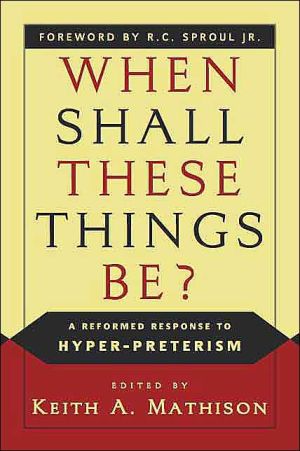

 |

|

The average rating for When Shall These Things Be?: A Reformed Response to Hyper-Preterism based on 2 reviews is 4 stars.
Review # 1 was written on 2008-01-20 00:00:00 Craig Savage Craig SavageGood collection of essays responding to the whacky eschatological position known as: hyper-preterism (the belief that all eschatological prophecy was fulfilled in 70 AD) . The only draw back is that many of the authors, though all agreeing with orthodox views on the future coming of Christ, the resurrection, a future new heavens and earth, &c., they do not (always) agree with each other's eschatology or hermeneutics. So, you have some who think Revelation was written before 70 AD, and some who do not. Some who take a preteristic approach to (some of) Matthew 24, and some who do not. Some of the contributors are postmillennial some are amillennial. This does add some slight tension in the book. But, the main thing to take away is that neither of those views allow for hyper-preterism. I though Hill's chapter on eschatology in the early church was particularly illuminating. He then quotes the lengths at which hyper-preterists have gone through to try to explain how their theology was missing entirely from church history. The reason this would be so shocking is because they claim that Jesus returned once and for all in 70 AD. They claim that the resurrection has already occurred. They claim that we are in the new heavens and earth right now. (Of course they define those terms differently than we (orthodox believers) do, so it isn't as absurd as it looks prima facie.) Surely if this was the case we would find the early church mentioning it. But, not only do we find silence (where there would be an expectation of noise, thus making this not an argument from silence) in the early church, we find many statements by the most learned and respected men of the early church to the contrary. Some of them knew, or were related to, Jesus' apostles. Richard Pratt offers a fine chapter on historical contingencies and how they affect the fulfillment of prophecies. This removes the rug from under the reductionist approach taken by the hyper-preterist. Simon Kistemaker offers some very good rebuttals to the idea that Revelation was written before 70 AD, as well as challenging hyper-preterist (and partial preterist, though not explicitly) interpretations of that book. I also enjoyed Robert Strimple's chapter on the resurrection. I remember hearing the editor (and fellow contributor, who provides a helpful look at the all important "time texts") saying that Strimple's chapter puts the nail in the coffin of hyper-preterist mumbo jumbo (not a direct quote!). |
Review # 2 was written on 2012-06-12 00:00:00 David Zeglis David ZeglisAn odd collection of essays against Hyper-Preterism. I was expecting more of the authors to be partial preterists and so full of believable interpretations of the disputed passages. Instead those chapters that dealt with the exegetical issues played into the hands of the Hypers and were less than convincing at handling the time texts. Still, there was some excellent critiques of the Hyper's system of theology even in the less helpful chapters. There were also two wonderful chapters dealing with historical theology and the Creeds; the latter by Doug Wilson. Altogether this is a worthwhile read. I just need now to find a critique by a partial preterist of the disputed texts and passages. Liked it. |
CAN'T FIND WHAT YOU'RE LOOKING FOR? CLICK HERE!!!